A rogue state otherwise known as an outlaw state, is a term applied by some international theorists to states that they consider threatening to the world's peace. This means being seen to meet certain criteria, such as being ruled by authoritarian or totalitarian governments that severely restrict human rights, sponsoring terrorism and seeking to proliferate weapons of mass destruction. The term is used most by the United States, and in his speech at the United Nations (UN) in 2017, U.S. President Donald Trump reiterated this phrase. However, it has been applied by other countries such as Germany as well as a term for the United States itself.

Ensuring national security, increasing influence among its Arab neighbours and securing the return of the Golan Heights, have been the primary goals of the Syrian Arab Republic's foreign policy. At many points in its history, Syria has seen virulent tension with its geographically cultural neighbours, such as Turkey, Israel, Iraq, and Lebanon. Syria enjoyed an improvement in relations with several of the states in its region in the 21st century, prior to the Arab Spring and the Syrian Civil War.
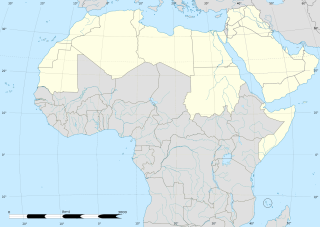
The Arab world, formally the Arab homeland, also known as the Arab nation, the Arabsphere, or the Arab states, consists of the 22 Arab countries which are members of the Arab League. A majority of these countries are located in Western Asia, North Africa, and the Horn of Africa; the southernmost member, the Comoros, is an island country off the coast of East Africa. The region stretches from the Atlantic Ocean in the west to the Arabian Sea in the east, and from the Mediterranean Sea in the north to the Indian Ocean in the southeast. The eastern part of the Arab world is known as the Mashriq, and the western part as the Maghreb. Arabic is used as the lingua franca throughout the Arab world.

William Jefferson Hague, Baron Hague of Richmond, is a British Conservative politician and life peer. He represented Richmond, Yorkshire, as its Member of Parliament (MP) from 1989 until 2015 and was the Leader of the Opposition from 1997 to 2001. He was Secretary of State for Foreign and Commonwealth Affairs from 2010 to 2014 and was the Leader of the House of Commons from 2014 to 2015.
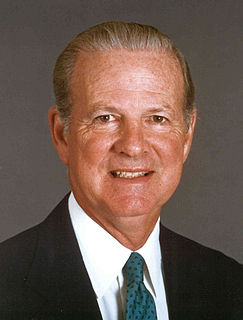
James Addison Baker III is an American attorney, statesman, and political figure. He served as White House Chief of Staff and United States Secretary of the Treasury under President Ronald Reagan, and as U.S. Secretary of State and White House Chief of Staff under President George H. W. Bush.

The Cooperation Council for the Arab States of the Gulf, originally known as the Gulf Cooperation Council, is a regional intergovernmental political and economic union consisting of all Arab states of the Persian Gulf - Bahrain, Kuwait, Oman, Qatar, Saudi Arabia, and the United Arab Emirates - except for Iraq. The Charter of the GCC was signed on 25 May 1981, formally establishing the institution.
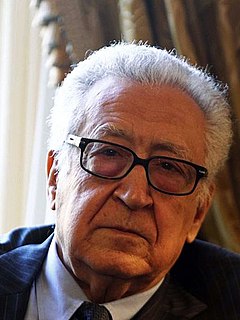
Lakhdar Brahimi is an Algerian United Nations diplomat who served as the United Nations and Arab League Special Envoy to Syria until 14 May 2014. He was Minister of Foreign Affairs of Algeria from 1991 to 1993.
A provisional government, also called an interim government, an emergency government, or a transitional government, is an emergency governmental authority set up to manage a political transition generally in the cases of new nations or following the collapse of the previous governing administration. Provisional governments are generally appointed, and frequently arise, either during or after civil or foreign wars.

The United Nations Human Rights Council (HRC) is a United Nations body whose mission is to promote and protect human rights around the world. The United Nations Human Rights Council has 47 members elected for staggered three-year terms on a regional group basis. The headquarters of the United Nations Human Rights Council is in Geneva, Switzerland.

MENA is an English-language acronym referring to the Middle East and North Africa. It is alternatively called the WANA. The MENA acronym is often used in academia, military planning, disaster relief, media planning as a broadcast region, and business writing. Moreover, the region shares a number of cultural, economic and environmental similarities across the countries; for example, some of the most extreme impacts of climate change will be felt in the region.

Veterans for Peace is an organization founded in 1985. It was initially made up of US military veterans of World War II, the Korean War, the Vietnam War, the Gulf War, and other conflicts, as well as peacetime veterans and non-veterans but has since spread overseas and has a very active offshoot in the United Kingdom. The group works to promote alternatives to war. The organization has opposed the military policies of the United States, NATO and Israel, and has opposed military actions and threats to Russia, Iraq, Afghanistan, Iran, Libya and Syria.

Human rights in the Middle East have been shaped by the legal and political development of international human rights law after the Second World War, and their application to the Middle East. The 2004 United Nations Arab Human Development Report (AHDR) claimed that although Arab-Islamic tradition does hold unique importance for ideas of human welfare, History has proven that "they were not sufficiently prevalent in society to foster a culture based on a political contract, and allow for the legitimacy of differences of opinion, dialogue and transfer of power." Issues of the validity of democracy in the region and human rights are at the very centre of the challenges facing Middle Eastern society today.

Zeid Ra'ad Zeid Al Hussein is the Perry World House Professor of the Practice of Law and Human Rights at the University of Pennsylvania. He is also the president and CEO of the International Peace Institute. He is a former Jordanian diplomat who also served as United Nations High Commissioner for Human Rights from 2014 to 2018. He played a central role in the establishment of the International Criminal Court, and was elected the first president of the Assembly of State Parties of the International Criminal Court in September 2002. He also served as a political affairs officer in UNPROFOR in the former Yugoslavia from 1994 to 1996.

The Islamic State of Iraq and the Levant, also known as the Islamic State of Iraq and Syria, officially known as the Islamic State (IS) and also known by its Arabic acronym Daesh, is an unrecognized proto-state that follows a Salafi jihadist doctrine. ISIL was founded by Abu Musab al-Zarqawi and gained global prominence in 2014 when it drove Iraqi security forces out of key cities in its Western Iraq offensive, followed by its capture of Mosul and the Sinjar massacre.
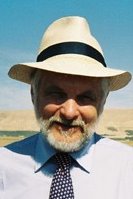
William Morris is Secretary General of the Next Century Foundation.

Nickolai Evtimov Mladenov is a Bulgarian politician and diplomat who served as Bulgaria's Minister of Defense from 27 July 2009 to 27 January 2010 and as the minister of foreign affairs in the government of then prime minister Boyko Borisov from 2010 to 2013. Prior to that, he was a Member of the European Parliament from 2007 to 2009.
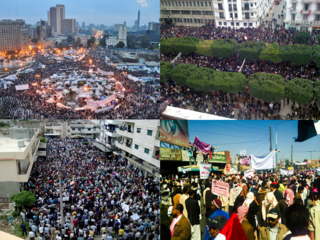
The Arab Spring was a series of anti-government protests, uprisings, and armed rebellions that spread across much of the Arab world in the early 2010s. It began in response to oppressive regimes and a low standard of living, starting with protests in Tunisia. From Tunisia, the protests then spread to five other countries: Libya, Egypt, Yemen, Syria, and Bahrain, where either the ruler was deposed or major uprisings and social violence occurred including riots, civil wars, or insurgencies. Sustained street demonstrations took place in Morocco, Iraq, Algeria, Iranian Khuzestan, Lebanon, Jordan, Kuwait, Oman, and Sudan. Minor protests took place in Djibouti, Mauritania, Palestine, Saudi Arabia, and the Moroccan-occupied Western Sahara. A major slogan of the demonstrators in the Arab world is ash-shaʻb yurīd isqāṭ an-niẓām!.

The United Nations Support Mission in Libya (UNSMIL) is a United Nations (UN) advanced mission in Libya, created in the aftermath of the Libyan Civil War. UNSMIL is a political mission, not a military mission. The main elements of its mandate defined by the UN include supporting Libyan transitional authorities in "post-conflict efforts", providing mediation in implementing Libyan political agreements, supporting key Libyan institutions and monitoring and reporting on human rights. UNSMIL is led by the UN Department of Political Affairs.

The Turkish military intervention in the Second Libyan Civil War is a military intervention by Turkey in support of the UN-recognized Government of National Accord (GNA) of Libya in the Second Libyan Civil War. Military intervention was approved by the Grand National Assembly of Turkey on 2 January 2020, which passed a one-year mandate to deploy troops to Libya. Turkish military deployments to Libya began on 5 January.


















